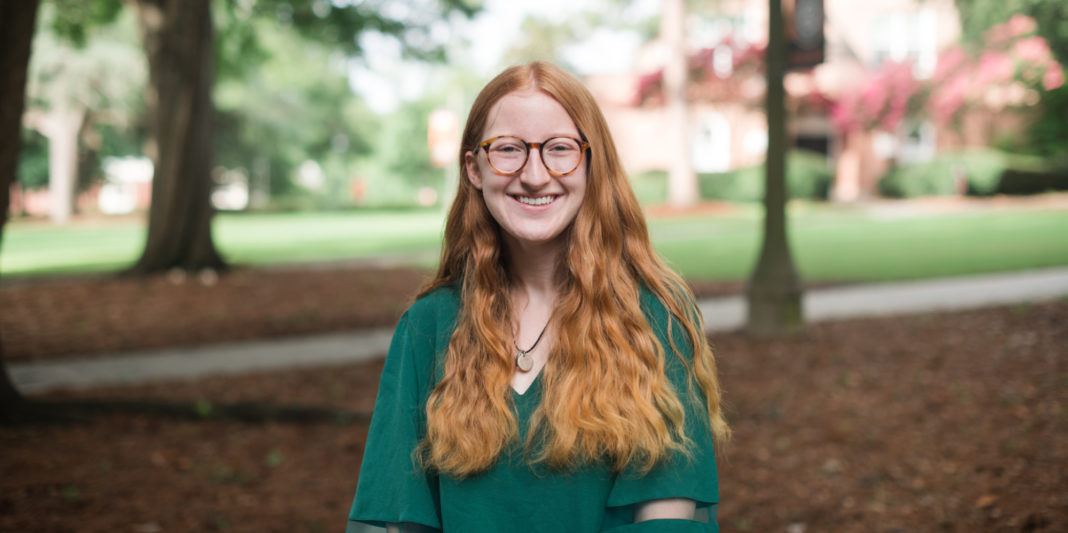MACON – Mercer University junior Kaitlyn Fowler was one of 173 student civic leaders selected to Campus Compact’s 2022-2023 cohort of Newman Civic Fellows.
Fowler, a sociology major and Stamps Scholar from Jackson, Mississippi, joins students from 38 states, Washington, D.C., and Mexico to form the cohort.
Campus Compact is a national coalition of colleges and universities working to advance the public purposes of higher education. The Newman Civic Fellowship recognizes students who stand out for their commitment to creating positive change in communities locally and around the world.
The fellowship is named for the late Frank Newman, one of Campus Compact’s founders, who was a tireless advocate for civic engagement in higher education. In the spirit of Dr. Newman’s leadership, fellows are nominated by Campus Compact member presidents and chancellors, who are invited to select one outstanding student from their campus each year.
Fowler is a passionate advocate for restorative justice policies in schools. She was highly involved in her high school and home community, driven by her own experiences as a student and demonstrated through her leadership roles in the community. She has built on these experiences at Mercer by working with local students as a reading tutor and meeting with area school leaders.
“Growing up, I attended a low-income, majority-Black school district. While I loved my schools, I often felt the effects of chronic underfunding through a lack of textbooks, leaking roofs and overcrowded classrooms,” said Fowler. “In high school, I realized how the harsh, zero-tolerance discipline policies disproportionately affected and penalized Black and minority students, feeding the school-to-prison pipeline. I became passionate about the idea of restorative justice – a practice that emphasizes community, relationships, respect and the reparation of harms. I am advocating for policy change and want to assist schools in developing the best restorative justice practices and implementation plans for their school community.”
Fowler has developed a collaborative research plan to perform a case study of a local school system’s restorative justice program in the early stages of implementation. Her work will provide school leadership with a data-grounded evaluation of strengths, weaknesses and overall effectiveness of their current implementation process.
“Kaitlyn’s planned community-based research is impressive. This case study could serve as a potential model for restorative justice policy implementation in other communities,” said Dr. Kathryn Kloepper, vice provost of engaged learning and associate professor of chemistry. “In addition to working with local school leaders, Kaitlyn also will receive important guidance and support from her faculty mentor, Dr. Laura Simon, assistant professor of sociology, and Campus Compact.”
Campus Compact provides fellows with a year of learning and networking opportunities that emphasize personal, professional and civic growth. Each year, fellows participate in numerous virtual training and networking opportunities to help provide them with the skills and connections they need to create large-scale positive change.
The cornerstone of the fellowship is the Annual Convening of Fellows, which offers intensive skill-building and networking over two days. The fellowship also provides fellows with pathways to apply for exclusive scholarship and postgraduate opportunities.
“We are proud to name such an outstanding and diverse group of students Newman Civic Fellows,” said Campus Compact President Bobbie Laur. “Their passion and resolve to take action on the wide range of issues challenging our neighborhoods and communities is inspiring and deeply needed. We cannot wait to engage with them through this transformative experience.”
The Newman Civic Fellowship program is supported by the KPMG Foundation.
About Campus Compact
Campus Compact is a national coalition of colleges and universities committed to the public purposes of higher education. Campus Compact supports institutions in fulfilling their public purposes by deepening their ability to improve community life and to educate students for civic and social responsibility. As the largest national higher education association dedicated solely to campus-based civic engagement, we provide professional development to administrators and faculty to enable them to engage effectively, facilitate national partnerships connecting campuses with key issues in their local communities, build pilot programs to test and refine promising models in engaged teaching and scholarship, celebrate and cultivate student civic leadership, and convene higher education institutions and partners beyond higher education to share knowledge and develop collective capacity. Visit www.compact.org.










